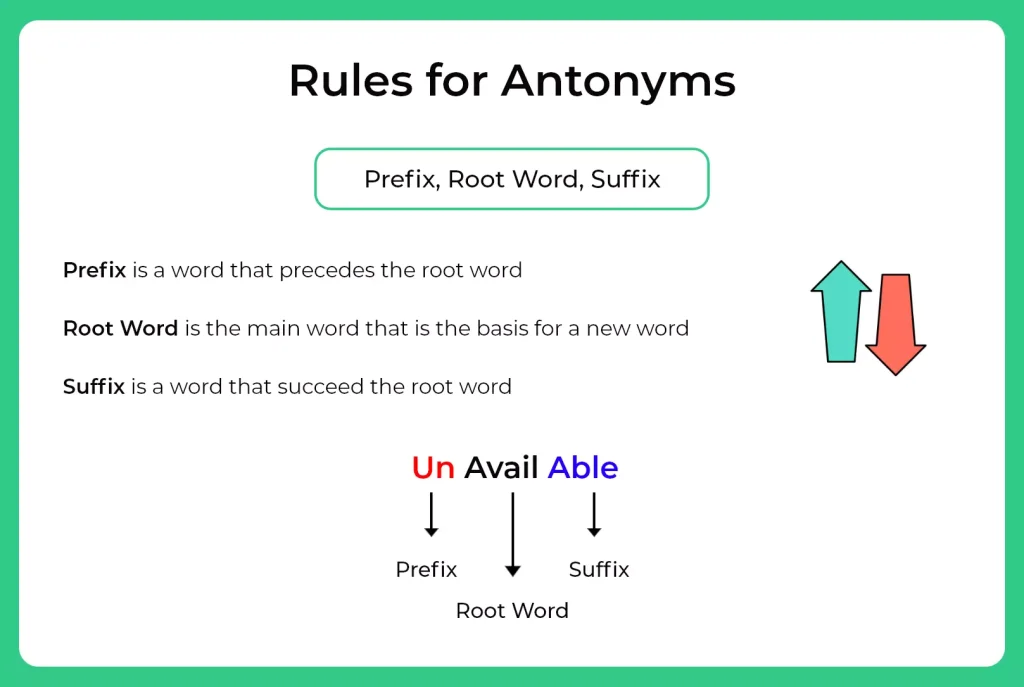Verbal Menu
- Basic Grammar
- Speech and Voices
- Tenses
- Articles
- Tenses and Articles
- Idioms and Phrases
- Subject Verb Agreement
- Prepositions and Conjunction
- Selecting Words
- Relative Pronoun
- Sentence Completion
- Sentence Ordering
- Contextual Vocabulary
- Jumbled Sentence
- Sentence Formation
- Error Identification
- Sentence Improvement and Construction
- Cloze Test
- Fill in the blanks
- Paragraph Ordering
- Para Jumbles
- Synonyms and Antonyms
- Synonyms
- Antonyms
- Reading Comprehension
- Get Off-campus Drive Updates
- Get Hiring Updates
- Contact US
PREPINSTA PRIME
Rules For Antonyms
Rules for Antonyms
Before understanding the Rules for Antonyms we first need to know the definition.
The term Antonym means a phrase or word which means just the opposite to the given the word or phrase in the same language.

Rules For Antonyms
Each English word contains a root or a suffix or prefix, so all we have to do is to find that root, analyze whether it is of Greek or a Latin origin and then derive the meaning out of the word. And finally, find out the word which means exactly the opposite of that word.
Rule 1 – Answer Choices
Take note of positively and negatively charged answer choices. It is possible to associate a negative or positive charge with almost any given word.
Try to discern whether each word in the following list has a –
- positive (+)
- negative (-), or
- neutral (=) charge.
Choose the best synonym/antonym based on its charge.
Rule 2 – Types of Antonyms
Antonyms have been categorized into two parts, for a better understanding of the students.
Types of Antonyms:
- Gradable Antonyms: they offer a middle ground to all the words and act on a graded spectrum i.e. within a range.
- let’s take a word fat. Now it’s antonyms can be thin, skinny, slender, slight, slim, (Here you can see there’s a range of words from very thin to not too thin.)
- old – new, young, youthful, current, fresh, modern, green. (here old was either age or time, hence all antonyms fall into a broader range)
- Complementary Antonyms: these are the ones that stand in complete contrast to each other.
- push and pull
- In and out
- Up and down
- right and left
- Relational Antonyms: Also known as relational antonyms, the relation of these antonyms are universally opposite.
- black and white
- husband and wife
- pen and paper
Rule 3 – Root Word, Prefix and Suffix
Answering a question without knowing its meaning can be difficult. However, if you have an idea about the root words and prefix or suffix, the process becomes easier.
Root Words:
The basic or the main word that can be used to form different word and still relate to the same meaning is known as a root word.
For example:
- Form – meaning Shape
- reform – rebuilding the shape
- deform – breakdown a shape
- Formless – something that has no shape.
Prefix:
Words that are placed before the root word to change its meaning.
- Positive prefix – pre, pro, re, super, en, co etc.
- Negative Prefix – de, ir, im, mal, un, non, a, in etc.
For example:
- able – unable
- sane – insane
- respect – disrespect
- Operate – cooperate
- code – decode
- symmetrical – asymmetrical
- sure – ensure
Suffix:
Words that are placed after the root word to change its meaning.
- Some of the suffix are: less, ful, ment, ion, ive, dom, ism, ness, ship etc.
For example:
- Free – freedom
- Friend – Friendship
- attain – attainment
- happy – happiness
- harm – harmful
- harm – harmless

Prime Course Trailer
Related Banners
Get PrepInsta Prime & get Access to all 200+ courses offered by PrepInsta in One Subscription
Learn Antonyms Faster
- Read Widely
Reading newspapers, novels, and online articles will naturally introduce you to antonyms. - Use Vocabulary Apps
Apps or vocabulary games can help you practice antonyms interactively. - Make a Personal Antonym List
Write down new words and their antonyms to revise regularly. - Practice Mock Tests
Solving previous-year exam papers and vocabulary quizzes sharpens your antonym-solving skills.
Also Check Out
Also Check:
- Basic Grammar – Questions | Rules | How to Solve Quickly | Tricks & Shortcuts
- Speech and Voices – Questions | Rules | How to Solve Quickly | Tricks & Shortcuts
- Tenses – Questions | Rules | How to Solve Quickly | Tricks & Shortcuts
- Tenses and Articles – Questions | Rules | How to Solve Quickly | Tricks & Shortcuts
- Idioms and Phrases – Questions | Rules | How to Solve Quickly | Tricks & Shortcuts
- Subject Verb Agreement – Questions | Rules | How to Solve Quickly | Tricks & Shortcuts
- Prepositions and Conjunction – Questions | Rules | How to Solve Quickly | Tricks & Shortcuts
- Selecting Words – Questions | Rules | How to Solve Quickly | Tricks & Shortcuts
- Relative Pronoun – Questions | Rules | How to Solve Quickly | Tricks & Shortcuts
- Sentence Completion- Questions | Rules | How to Solve Quickly | Tricks & Shortcuts
- Basic Grammar
Questions
Rules
How to Solve Quickly
Tricks & Shortcuts - Speech and Voices
Questions
Rules
How to Solve Quickly
Tricks & Shortcuts - Tenses
Questions
Rules
How to Solve Quickly
Tricks & Shortcuts - Tenses and Articles
Questions
Rules
How to Solve Quickly
Tricks & Shortcuts - Idioms and Phrases
Questions
Rules
How to Solve Quickly
Tricks & Shortcuts - Subject Verb Agreement
Questions
Rules
How to Solve Quickly
Tricks & Shortcuts - Prepositions and Conjunction
Questions
Rules
How to Solve Quickly
Tricks & Shortcuts - Selecting Words
Questions
Rules
How to Solve Quickly
Tricks & Shortcuts - Relative Pronoun
Questions
Rules
How to Solve Quickly
Tricks & Shortcuts - Sentence Completion
Questions
Rules
How to Solve Quickly
Tricks & Shortcuts
Get over 200+ course One Subscription
Courses like AI/ML, Cloud Computing, Ethical Hacking, C, C++, Java, Python, DSA (All Languages), Competitive Coding (All Languages), TCS, Infosys, Wipro, Amazon, DBMS, SQL and others

 Apply For Jobs
Apply For Jobs Get Hiring Updates
Get Hiring Updates




Login/Signup to comment